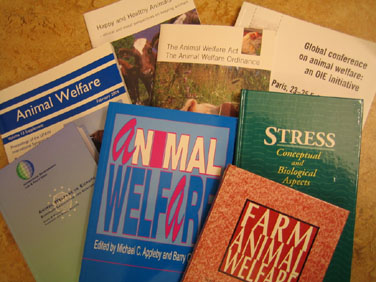The term ‘animal welfare’ refers to an animal’s well-being — i.e. how well off, or badly off, the animal is. There are three different theories about welfare, which may underlie assessments of animal welfare:
- Welfare defined as mental well-being (Hedonism): Welfare is greatest where an animal has many positive stimulations resulting in pleasant or enjoyable experiences and few negative stimulations resulting in unpleasant or painful experiences.
Many animals, like humans, are capable of subjective experience.
Quotation:
”... sentience, in other words feelings, is what welfare is all about” (Duncan, 1996 Animal welfare defined in terms of feelings. Acta Agriculturae Scandinavica (Section A: Animal Science) 27, 29-35 (Suppl) )
Welfare defined as preference satisfaction : This theory can be difficult to use when assessing animal welfare, because it is not obvious that animals have conscious preferences or ambitions in the way humans do.
At the same time, however, animals can strive for things and do seem to be guided by goals for which they are willing to work hard.
- Welfare defined as natural living or physical fitness (Perfectionism) : Welfare involves realising potentials that are typical of one’s species, and it is not necessary to feel well in doing this. Animal species are assumed to have a well-defined nature.
Quotations:
”The welfare of an animal is its state as regards its attempts to cope with its environments” (Broom, 1991, Animal welfare: concepts and measurement. Journal of Animal Science 69, 4167-4175 )
”It is likely the emerging social ethic for animals ... will demand from scientists data relevant to a much increased concept of welfare. Not only will welfare mean control of pain and suffering, it will also entail nurturing and fulfilment of the animals’ natures, which I call telos” (Rollin, 1993 Animal welfare, science and value. Journal of Agricultural and Environmental Ethics 6: 44-50 (Suppl 2)
|


